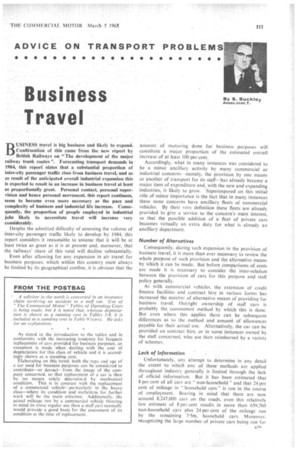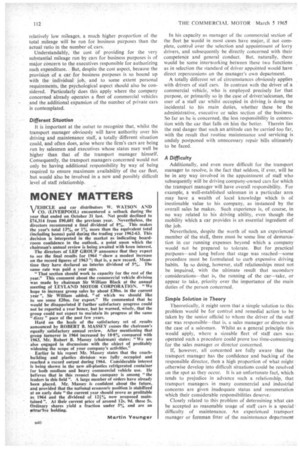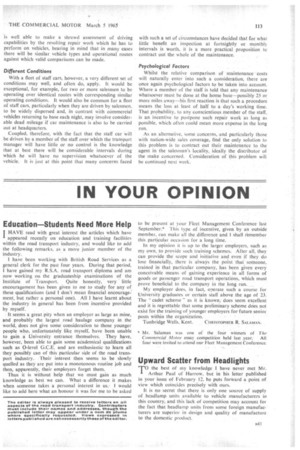Business Travel
Page 113

Page 114

Page 115

If you've noticed an error in this article please click here to report it so we can fix it.
BUSINESS travel is big business And likely to expand. Confirmation of this came from the new report by British Railways on " The development of the major railway trunk routes ". Forecasting transport demands in 1984, .this report states that a substantial proportion of inter-city passenger traffic rises from business travel, and as as result of the anticipated overall industrial expansion this is expected to result in an increase in business travel at least as proportionally great. Personal contact, personal supervision and hence personal movement, this report continues, seem to become even more necessary as the pace and complexity of business and industrial life increase. Consequently, the proportion of people employed in industrial jobs likely to necessitate travel will increase very considerably.
Despite the admitted difficulty of assessing the volume of inter-city passenger traffic likely to develop by 1984, this report considers it reasonable to assume that it will be at least twice as great as it is at present and, moreover, that the railways' share of this total will decline substantially.
Even after allowing for any expansion in air travel for business purposes, which within this country must always be limited by its geographical confine, it is obvious that the amount of motoring done for business purposes will constitute -a major proportion of the estimated overall increase of at least 100 per cent.
Accordingly, what in many instances was considered to be a minor ancillary activity by many commercial or industrial concerns—namely, the provision by one means or another of transport for its staff—has already become a major item of expenditure and, with the new and expanding industries, is likely to grow. Superimposed on this initial role of minor importance is the fact that in many instances these same concerns have ancillary fleets of commercial vehicles. By their very definition these fleets are already provided to give a service to the concern's main interest, so that the possible addition of a fleet of private cars becomes virtually an extra duty for what is already an ancillary department.
Number of Alternatives
Consequently, during such expansion in the provision of business travel, it is more than ever necessary to review the whole purpose of such provision and the alternative means by which it can be made. But before comparisons of costs are made it is necessary to consider the inter-relation between the provision of cars for this purpose and staff policy generally.
As with commercial vehicles, the extension of credit finance facilities and contract hire in various forms has increased the number of alternative means of providing for business travel. Outright ownership of staff cars is probably the, commonest method by which this is done. But even where this applies there can be subsequent differences as to the method and amount of allowances payable for their actual use. Alternatively, the car can be provided on contract hire, or in some instances owned by the staff concerned, who are then reimbursed by a variety of schemes.
Lack of Information
Unfortunately, any attempt to determine in any detail the extent to which any of these methods are applied throughout industry generally is limited through the lack of official information. But it has been estimated that 8 per cent of all cars arc " non-household " and that 24 per cent of mileage in " household cars" is run in the course of employment. Bearing in mind that there are now around 8,247,000 cars on the roads, even this relatively low estimate of 8 per cent results in more than 659.760 non-household cars plus 24 per cent or the mileage run by the remaining 7.5m. household cars. Moreover, recognizing the large number of private cars being run for
relatively low mileages, a much higher proportion of the total mileage will be run for business purposes than the actual ratio in the number of cars.
Understandably, the cost of providing for the very substantial mileage run by cars for business purposes is of major concern to the executives responsible for authorizing such expenditure. But, despite the cost aspect, because the provision of a car for business purposes is so bound up with the individual job, and to some extent personal requirements, the psychological aspect should also be considered. Particularly does this apply where the company concerned already operates a fleet of commercial vehicles and the additional expansion of the number of private cars is contemplated.
Different Situation
It is important at the outset to recognize that, whilst the transport manager obviously will have authority over his driving and maintenance staff, a totally different situation could, and often does, arise where the firm's cars are being run by salesmen and executives whose status may well be higher than that of the transport manager himself. Consequently, the transport managers concerned would not only be having additional responsibility by way of being required to ensure maximum availability of the car fleet, but would also be involved in a new and possibly difficult level of staff relationship.
In his capacity as manager of the commercial section of the fleet he would in most cases have major, if not complete, control over the selection and appointment of lorry drivers, and subsequently be directly concerned with their competence and general conduct. But, naturally, there would be some interworking between these two functions as in selection the standard of driver appointed would have direct repercussions on the manager's own department.
A totally different set of circumstances obviously applies with drivers of staff cars. In contrast with the driver of a commercial vehicle, who is employed precisely for that purpose, or primarily so in the case of driver/salesman, the user of a staff car whilst occupied in driving is doing so incidental to his main duties, whether these be the administrative, executive or sales section of the business. So far as he is concerned, the less responsibility in connection with the car that falls on him the better. Therein lies the real danger that such an attitude can be carried too far, with the result that routine maintenance and servicing is unduly postponed with unnecessary repair bills ultimately to be faced.
A Difficulty Additionally, and even more difficult for the transport manager to resolve, is the fact that seldom, if ever, will he be in any way involved in the appointment of staff who subsequently will be driving company-owned cars for which the transport manager will have overall responsibility. For example, a well-established salesman in a particular area may have a wealth of local knowledge which is of inestimable value to his company, as instanced by the overall sales he makes. Such experience is, of course, in no way related to his driving ability, even though the mobility which a car provides is an essential ingredient of the job.
Nevertheless, despite the worth of such an experienced' member of the staff, there must be some line of demarcation in car running expenses beyond which a company would not be prepared to tolerate. But for ,practical purposes—and long before that stage was reached—some procedure must be formulated to curb expensive driving habits. in so doing, however, staff relationships must not be impaired, with the ultimate result that secondary considerations—that is, the running of the car—take, or appear to take, priority over the importance of the main duties of the person concerned.
Simple Solution in Theory Theoretically, it might seem that a simple solution to this problem would be for control and remedial action to be taken by the senior official to whom the driver of the staff car was responsible --that is, a sales manager or director in the case of a salesman. Whilst as a general principle this would apply, where a sizeable fleet of staff cars was operated such a procedure could prove too time-consuming for the sales manager or director concerned.
If, however, all concerned are fully a+,vare that the transport manager has the confidence and backing of the responsible director, then a high proportion of what might otherwise develop into difficult situations could be resolved on the spot as they occur. It is an unfortunate fact, which tends to prejudice in advance such a relationship, that transport managers in many commercial and industrial concerns are given inadequate status and remuneration which their considerable responsibilities deserve..
Closely related to this problem of determining what can be accepted as reasonable usage of staff cars is a special difficulty of maintenance. An experienced transport manager or foreman fitter of the maintenance department
is well able to make a shrewd assessment of driving capabilities by the resulting repair work which he has to perform on vehicles, bearing in mind that in many cases there will be similar vehicle types and operational routes against which valid comparisons can be made.
Different Conditions
With a fleet of staff cars, however, a very different set of conditions may well, and often do, apply. It would be exceptional, for example, for two or more salesmen to be operating over identical routes with corresponding similar operating conditions. It would also be common for a fleet of staff cars, particularly when they are driven by salesmen, to be widely dispersed and, in contrast with commercial vehicles returning to base each night, may involve considerable dead mileage if car maintenance is also to be carried out at headquarters.
Coupled, therefore, with the fact that the staff car will be driven by a member of the staff over which the transport manager will have little or no control is the knowledge that at best there will be considerable intervals during which he will have no supervision whatsoever of the vehicle. It is just at this point that many concerns faced
with such a set of circumstances have decided that for what little benefit an inspection at fortnightly or monthly intervals is worth, it is a more practical proposition to contract out the whole of the maintenance.
Psychological Factors
Whilst the relative comparison of maintenance 'costs will naturally enter into such a consideration, there are once again psychological factors to be taken into account. Where a member of the staff is told that any maintenance whatsoever must be done at the home base—possibly 25 or more miles away—his first reaction is that such a procedure means the loss at least of half to a day's working time. That probability, to any conscientious member of the staff, is an incentive to postpone such repair work as long as possible, which often could mean more expense in the long run.
As an alternative, some concerns, and particularly those with nation-wide sales coverage, find the only solution to this problem is to contract out their maintenance to the agent in the salesman's locality, ideally the distributor of the make concerned. Consideration of this problem will be continued next week.




























































































































































